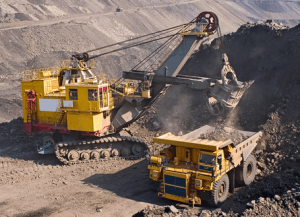Hopelessness envelopes Ghana’s mining towns even as country becomes top gold producer
 Recently, Ghana became the largest gold producer in Africa after overtaking South Africa but some residents of mining communities in Ghana doubt the significance of this feat, claiming that it would have no meaningful impact on their lives.
Recently, Ghana became the largest gold producer in Africa after overtaking South Africa but some residents of mining communities in Ghana doubt the significance of this feat, claiming that it would have no meaningful impact on their lives.
During a visit to some mining communities in Western Ghana residents expressed how they are appalled by the deplorable state they have lived in for years as they exuded little hope of a better future.
On June 10, 2019, Bloomberg reported that Ghana has overtaken South Africa to become the largest gold producer in Africa.
The report which cited figures from the Ghana Chamber of Mines and the Minerals Council of South Africa, said Ghana produced 4.8 million ounces of gold in 2018 as opposed to South Africa’s 4.2 million ounces.
According to the report, Ghana increased its production by 12 per cent in 2018 as against its 2017 record.
The report attributed Ghana’s increased production to friendlier policies, lower-cost mines and new development projects while citing frequent strikes, high cost and geological challenges as reasons for South Africa’s declining production.
Communities’ plights
But, Joshua Blay, a 42-year old resident of Tarkwa, told ghanabusinessnews.com in an interview that mining has been going on in Tarkwa for over a century yet residents continue to live in abject poverty, adding that, he expects nothing to change with the country’s new position on the global gold market.
“For us, this is no news. We’ve been living in this condition for many years despite all the resources that is taken from here. Nothing will change,” he maintained.
Tarkwa is the host of big mining firms including Anglogold Ashanti, Goldfields and the Ghana Manganese Company Limited but the town is bedeviled with poor sanitation, bad road networks, inadequate potable water and high youth unemployment.
The situation is even worse in Prestea, another mining town which hosts the Canadian mining firm, Golden Star Resources.
John Anderson, a cocoa farmer in Prestea, narrated how residents of the community grapple with pollution from dust on daily basis because almost all the roads in the community are not tarred.
“We live in a town with abundant gold deposits but we have nothing to show for it. It’s sad,” he said.
Anderson, who is now 61, recalled that not much has changed in the town in terms of social infrastructure since his youthful days.
“The roads had always been bad. We’d always struggled for water. Erratic electricity supply is not a new story,” he said.
Inadequate legislation
Unlike its petroleum sector, Ghana has no law guiding how revenues from mining are to be utilized except for royalties.
This has partly contributed to the poor state of mining communities in the country as there is little effort to channel part of the mining revenues into developing these communities.
Revenues collected from mining in the form of taxes and dividends are deposited into the Consolidated Fund, government’s central revenue pool, and utilized as the government deems fit.
Only revenues accruing from royalties are allocated according to a formula spelt out by legislation – the Minerals Development Fund (Act 912), which paves way for some revenues to be channeled back into the development of the mining communities.
Even so, a recent research on the Minerals Development Fund conducted by the Center for Extractives and Development, Africa (CEDA) showed several breaches in the distribution of funds to mining communities for development.
Two civil society groups – Africa Center for Energy Policy (ACEP) and Friends of the Nation (FoN), have therefore been leading a crusade for the passage of a comprehensive Minerals Revenue Management Bill with tightened accountability mechanisms to address this problem.
Already, a draft proposal of the bill had been developed by these organizations for government’s consideration while an online petition has been opened to secure signatures from citizens to push for the passage of the bill.
“It’s high time we ensured the proper management of our mineral revenues and we believe that this bill is in the right direction,” said Solomon Kusi Ampofo, the Natural Resource Governance Coordinator of FoN.
Low participation
Aside the issue of legislation, Ghana has not been maximizing its revenues from mining due to the state’s low participation in the industry. Almost all the multinational mining firms operating in Ghana are foreign-owned and unlike its petroleum sector, the country does not have a state-owned mining company to participate directly in the industry.
Revenues from mining over the years have been in the form of taxes, royalties and dividends from the country’s 10 per cent equity stake in some of the mining companies.
The Center for Social Impact Studies (CeSIS), an Obuasi-based civil society organization which focuses on the impact of mining, has not been enthused about this arrangement over the years.
The Executive Director of CeSIS, Mr. Richard Kojo Ellimah, told ghanabusinessnews.com that this trend must change stating that, the focus should be on developing local mining companies in the small scale sector which is reserved solely for Ghanaians.
“This is the best time to increase our support for small scale mining. With a sanitized small scale mining sector that operates in an environmentally sustainable manner we could further increase our production levels and subsequently our mineral revenues,” he said.
Meanwhile, government is still relishing its feat as Ghana tops gold production in Africa but the correlation between such an accomplishment and the level of development in mining communities across the country remains questionable.
By Marlvin-James Dadzie
Copyright ©2019 by Creative Imaginations Publicity
All rights reserved. This article or any portion thereof may not be reproduced or used in any manner whatsoever without the express written permission of the publisher except for the use of brief quotations in reviews.
